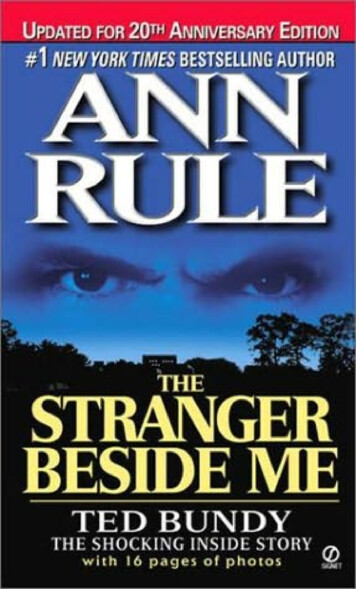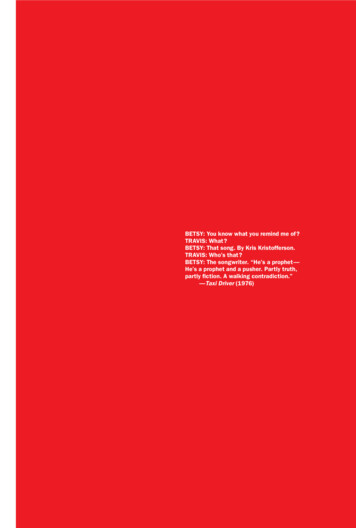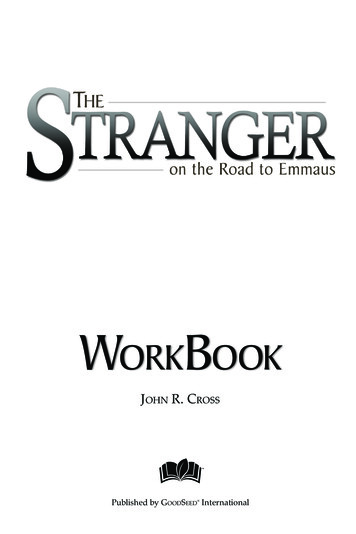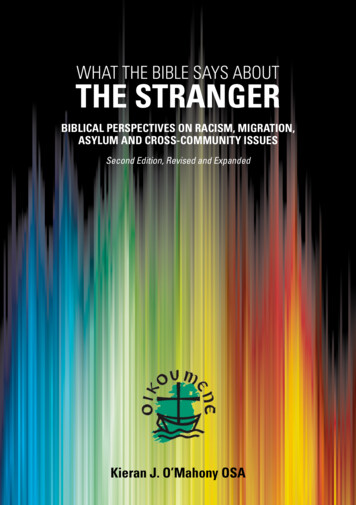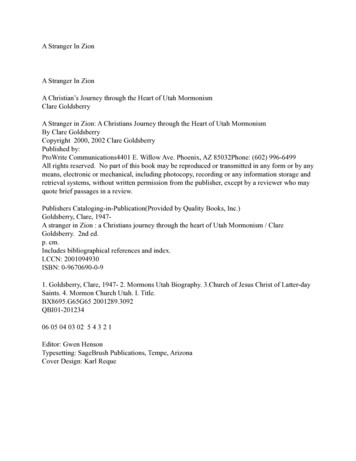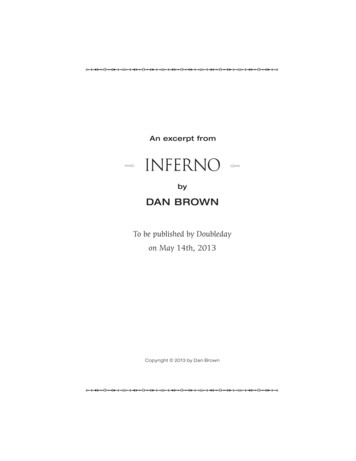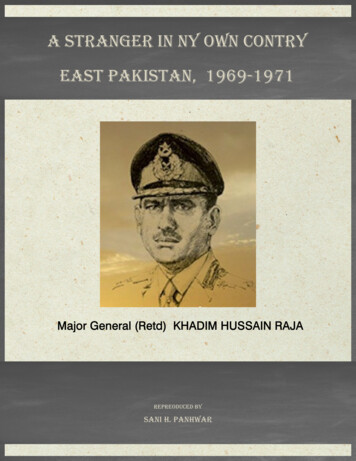
Transcription
A Stranger in Ny Own ContryEast Pakistan, 1969-1971repreoduced bySani H. Panhwar
A Stra nger in m yow n c ountryEa stPa kista n, 1969-1971Ma jor Genera l (Retd) Kha dim Hussa in Ra jaReproduc ed b ySa niH. Pa nhw a r
C O N TE N TSIntroductionBy Muhammad Reza KazimiChapter 1The Brewing Storm.1.6Chapter 2Prelude to the 1970 Elections.13.22Chapter 4The Devastating Cyclone of November 1970.26Chapter 5A No-Win Situation.28Chapter 6The Crisis Deepens.32Chapter 7Lt. Gen. Tikka Khan in Action.42Chapter 8Operation Searchlight.50Chapter 9Last Words . . .63Chapter 3The Rising Sun of the Awami LeagueAppendix A.70Appendix B.71Appendix C.78
In troductionB y M uham m adReza K azim iHistory, it is often said, 'is written by victors'. In the case of East Pakistan, it has beenwritten by the losers. One general,1 one lieutenant general,2 four major generals,3 andtwo brigadiers4 have given their account of the events leading to the secession of EastPakistan. Some of their compatriots, who witnessed or participated in the event, are stillreluctant to publish their impressions. The credibility of such accounts depends onwhether they were written for self-justification or for introspection. The utility of suchaccounts depends on whether they are relevant. On both counts, these recollections ofthe late Major General Khadim Hussain Raja are of definite value. They are candid andrevealing; they are also imbued with respect for the opposite point of view. He does notfully endorse, but offers for our consideration, a parallel study by the Bengalieconomist, Rehman Sobhan. These recollections were recorded before, but are beingpublished after the release of the Hamoodur Rahman Commission Report.5It is a tribute to the honesty and perception of Khadim Hussain Raja that A Stranger inMy Own Country is still of interest to the citizens of Pakistan, India, and Bangladesh;though it is of special worth and utility for the people of Pakistan who need to1GeneralAghaM oham m ad YahyaKhan,The Breaking of Pakistan,Islam abad:AlBasit,1972.2L ieutenantGeneralA.A.K.N iazi,The Betrayal of East Pakistan,Karachi:O xfordU niversity P ress,1998.3M ajorGeneralR ao Farm an Ali,How Pakistan Got Divided, L ahore: Jang P ublishers,1992; Kam aiM atinuddin,Tragedy of Error 1968-1971,L ahore: W ajid Ails,1994; M ajorGeneralHakeem Arshad Q ureshi,The 1971 IndoPakistan War: A. Soldier's Narrative,Karachi: O xford U niversity P ress,2002; M ajorGeneralA.O .M itha,UnlikelyBeginnings: A Soldier's Life,Karachi,O xfordU niversity P ress,2003.4BrigadierS iddiq S alik,Witness to Surrender,Karachi:O xford U niversity P ress,1977;BrigadierA.R .S iddiqi,EastPakistan: The End Game,Karachi:O xford U niversity P ress,2004.5T he report w asprepared by acom m ission appointed by Bhutto in 1972 and led by ChiefJustice Ham oodurR ahm an.R ahm an w asaBengalibut chose to rem ain in P akistan.T he report w asw ithheld by the Governm ent ofP akistan.A purported textofthereportw aspublished in IndiaT oday,in Decem ber2000.T hen,w hatissaid ro bethe com plete text,w asreleased by the Governm ent ofP akistan,although there isspeculation than som e secretdocum entshad been w ithheld.T he text w aspublished asT he R eport ofthe Ham oodurR ahm an Com m ission ofInquiry into the 1971 W arasDeclassified by the Governm ent ofP akistan (L ahore:Vanguard,2001).'T he reportishighly criticalofthem ilitary leadership forstrategicand tacticalerrorsand m isjudgm entsand foritstreatm entofthe Bengalipopulation.It also criticizesBhutto'sconcept oftw o m ajoritiesin P akistan: that ofthe P P P in W estP akistan and oftheAw am iL eaguein EastP akistan.T hecom m ission statesthatBhutto'sconceptm ightbefirforaconfederalistsystem ,notafederalistone.ItalsonotesthattheAw am iL eagueheldam ajority intheassem bly w iththe pow ertoim pose aconstitution forP akistan.T hecom m ission suggested thatYahyaand hisassociates,such asT ikkaKhan,shouldbetriedforillegalusurpationofpow erfrom AyubKhan,butnotrialsw ereheld.A Stranger in my own country - East Pakistan, 1969-19741
distinguish between the structural and incidental causes of alienation and separation.The most favored explanation for the separation in Pakistan is simple and remorseful:We exploited East Pakistan and, when the people rose demanding their right of selfdetermination, the Pakistan military, then in power, retaliated with genocide. It servedPakistan right that Bangladesh seceded!However, history acquires meaning only if we are able to derive a principle from itsevents, for a principle can be applied to unfolding events to assess their likely outcome.Should we conclude then, from the above explanation of the split, that all people whoare exploited or tyrannized acquire the right to self-determination? Bangladesh is theonly country, after the Second World War, to succeed in its bid to secede. Thus, we haveto search for the uncommon factor between Bangladesh, Palestine, and Chechnya. If wemention Indian armed intervention as the overriding uncommon factor, we shall bebanal. It is not the fact that India took advantage of our internal dissensions that invitesintrospection, but the factors contributing to those dissensions.It is in identifying such factors that Khadim Hussain Raja has made his momentouscontribution. Apart from his direct narration of the events, his portrayal of the majordramatis, personae is insightful. These are Field Marshal Mohammad Ayub Khan,General Agha Mohammad Yahya Khan, Lieutenant General Tikka Khan, andLieutenant General A.A.K. Niazi.The author records the ire of Ayub Khan, when he was reassuring him that theopposition in Pakistan was of little consequence. This was at a time when the vital needwas for democracy. Khadim Hussain Raja's estimate was not merely personal. Herecalls that Indian pilgrims, during theHaj, warned him that the agitation against Ayub Khan was a grave error, and that thepeople of Pakistan would regret their emotional outburst. The people were agitating fordemocracy but what they achieved was instability and dismemberment. Events provedthe Indian pilgrims right. Are we then to conclude that outsiders have a clearer view ofevents than those who flow with them?The greatest temptation is to subscribe to a stand that has been vindicated, but the realquestion to pose is whether Ayub Khan's survival in power would have led to theretention of the eastern wing. It would not; and, while Khadim Hussain Raja records theIndian advice, he does not subscribe to it. The option was not of making a choicebetween stability and world respect on the one hand, and abstract principles likedemocracy on the other; the people of Pakistan were not agitating with one voice, butonly against a single ruler. The agitation in West Pakistan was against the TashkentA Stranger in my own country - East Pakistan, 1969-19742
Declaration6 and, in East Pakistan, for the implementation of the Six Points.' Thedivergence, which led to dismemberment, was already there.Khadim Hussain Raja has not left our question unanswered. Ayub Khan had made agrave error of judgment in thinking that the opposition was of little consequence. Heunderlines this by recounting how Ataur Rahman asked, long before the crackdown,when the "West Pakistan Army of Occupation" would leave East Pakistan'. It surfacesthat the opposition was gathering strength because it was being sidelined.Khadim. Hussain Raja admits freely that: 'In a totalitarian regime, only the person at thetop can take momentous and important decisions that are called for'. In his portrayal ofYahya Khan, Khadim Hussain Raja places emphasis on not the hierarchical, but thepersonalized nature of Yahya's regime. A military regime has a chain of commandwhich, if never democratic, is nevertheless efficient. Khadim Hussain Raja has shownhow Yahya Khan's debauchery broke even the command chain. He attempts no defenceof Yahya's moral character: 'too disgraceful to be put into print'. This resulted in seniorand responsible officers, like Lieutenant General Yaqub Khan and Admiral S.M. Ahsan,being denied access to the President. Yahya Khan's gullibility, with regard to thesignificance of the Six Points,7 could have been possible only in a crony-insulatedsituation and not within a disciplined military command. This was a medieval milieuand received a medieval response. Foreign intervention by itself, as we proposedearlier, did not constitute the uncommon factor.Khadim Hussain Raja wrongs Yahya Khan just once, when he accuses him of arbitrarilyundoing One Unit8 and inter-wing parity. On both these counts, a political consensus6T heT ashkentDeclarationw assigned by P residentAyubKlan forP akistan andP rim eM inisterL alBahadurS hastriforIndiaon 10 January 1966 in the capitalofU zbekistan w here the tw o leadershad been invited by AlekseiKosygin,theS ovietP rim eM inister.Kosygin acted asam ediatorbetw een thetw o states.Ayub w asopposed by thethen Foreign M inister,Zulfikar Ali Bhutto. Despite Bhutto'sopposition,Ayub joined S hastri in signing thedocum ent.T he tw o countriesagreed to w ithdraw theirtroopsto the boundariesexistingbefore the 1965 conflict.T he usualclauseto w orktow ard thepeacefulsettlem entoftheirdisputesw asagreed to,aclause thathashad nopositiveeffect.7T heS ix P ointsw ereannouncedin L ahorein N ovem ber1966 by S heikh M ujiburR ahm an and form ed thebasisofthe m anifesto of the Aw am iL eague in the 1970 election. T hese pointsw ere: (1) a federalparliam entarygovernm ent w ith free and regularelections;(2)federalgovernm ent to controlforeign affairsand defence;(3)aseparate currency orseparate fiscalaccountsforeach province to controlm ovem entofcapitalfrom eastto w est;(4) allpow er of taxation at the provinciallevelw ith the federalgovernm ent subsisting on grantsfrom theprovinces; (5) each federating unit could enter foreign trade agreem entson itsow n and controlthe foreignexchangeearned;(6)eachunitcouldraiseitsow nm ilitia.8In 1947 P akistan consisted oftw o w ings— Eastand W est.In 1955,allthe provincesand statesin W estP akistanw ere m erged into asingle adm inistrative entity underthe O ne U nit S chem e by P resident Ayub Khan.T hisw asdone to facilitate the processofconstitution m aking,to ensure the basisofparity betw een the tw o w ingsofthecountry and to prom ote nationalintegration by erasing provincialboundaries.T he O ne U nitsystem w asdissolvedon 1 July 1970 and alltheprovincesw ererestored.A Stranger in my own country - East Pakistan, 1969-19743
had already developed in both the wings. Nevertheless, Khadim Hussain Raja is mostpertinent when he laments that one whole year was allowed for the electoral campaign.The Legal Framework Order9 was drafted in a drift, and acquired a major flaw in thesense that a two-thirds majority—almost a universal convention—was not made acondition for framing of the Constitution. The 120-days limit placed on the ConstituentAssembly, to produce a constitution on pain of dissolution, was one of the most inaneprovisions that could have been imagined. To this slovenly attitude, described byKhadim Hussain Raja, must be added his observation that Yahya's advisers had tried touse money and influence against the Awami League, but these attempts were so crudethat they produced the opposite results.This belies the impression that the Yahya regime had given an open field to the AwamiLeague during the elections. This is the reason why the regime thought no politicalparty would emerge with an outright majority.The two other major players receiving Khadim Hussain Raja's attention are LieutenantGeneral A.A.K. Niazi and Lieutenant General Tilcka Khan. He needs only two strokesto portray Niazi. Niazi threatened to rape Bengali women, causing a Bengali officer ofthe Pakistan army to leave the room immediately and shoot himself. This act apparentlyleft Niazi unmoved because, the next day, brushing aside discussion about the ongoingconflict, he asked Raja for the phone numbers of his 'girl friends'. Tikka Khan's venalityis clearly apparent but, still, it was because of his temperament that the crisisexacerbated. Disregarding Khadim Hussain Raja's advice that Sheikh Mujibur Rahmanbe flown out in secrecy, Tikka Khan spoke of trying and hanging Sheikh MujiburRahman, right there in Dhaka!As for the stages in which the crisis unfolded, Khadim Hussain Raja does not take sides.While he blames the outbreak of violence on the Awami League, he also makes itabundantly clear that Yahya Khan had decided upon military action inJanuary/February 1971, in advance of the 1 March 1971 outbreak of violence. Thisdecision seems to be one of the shadows which overcast the tripartite conferencebetween Yahya Khan, Sheikh Mujibur Rahman, and Zulfikar Ali Bhutto.Khadim Hussain Raja decries the crisis of legitimacy, as also the constitutional vacuum,which enabled the crisis to overflow international frontiers. He strongly disapproves ofthe moral lapses; he notes the deep-seated ethnic prejudice that had gathered9T he L egalFram ew ork O rderissued on 31 M arch 1970,contained the follow ing points: (1)P akistan m ust bebased on Islam icideology;(2)the country m ust have adem ocraticConstitution providing free and fairelections;(3) P akistan'sterritory m ust be upheld in the Constitution; (4) the disparity betw een the w ings,particularly ineconom icdevelopm ent,m ust be elim inated by statutory provisionsto be guaranteed by the Constitution;(5)thedistribution ofpow erm ustbem adein such aw ay thattheprovincesenjoy them axim um ofautonom y consistentw ith giving the CentralGovernm ent sufficient pow er to discharge itsfederal responsibilities,including them aintenanceofthecountry'sterritorialintegrity.A Stranger in my own country - East Pakistan, 1969-19744
momentum once the patriotic fervor of the 1965 war had abated; but, as the underlyingand crucial cause of the debacle, he focuses on the denial of opportunity, a featureinherent in autocratic rule: The historic example of the independent state of Pakistanwas too recent to be forgotten'.This observation alone prevents us from treating his text as just history. Doing so willinevitably lead to our history becoming our destiny. These are the findings of acourageous, upright, and patriotic warrior. They demand, for our own survival, ourclosest attention.A Stranger in my own country - East Pakistan, 1969-19745
1The B rew in g S tormLate in 1967, General Headquarters detailed me to attend the Army War Coursebeginning in February 1968. The course had been held at the army's Command andStaff College in Quetta for the preceding few years. It was meant to train senior armyofficers in the higher direction of war and staff duties at that level. The course also hadone representative each from the navy and air force. In the first few years of itsexistence, the course had developed a poor reputation. Officers who could not beaccommodated in appropriate jobs were detailed for this course. Consequently, it hadacquired the droll subtitle of 'pre-retirement' training. With a few honorable exceptions,no one taking the course was promoted to higher positions of responsibility. To remedythis situation, the Chief of the General Staff personally selected officers for the 1968 WarCourse. This appeared to have worked, as more than half of us reached the rank of'General'. The War Course turned out to be an interesting experience, despite the factthat I was initially disgruntled at being chosen for it.In early 1966, when Headquarters 4 Corps was raised at Multan, the new CorpsCommander, Lieutenant General M. Attiqur Rahman, selected me as his Chief of Staff.It was a challenge for all of us on the staff because the sister corps HQ, 1 Corps, hadbeen established quite a few years earlier. However, we galvanized ourselves into aneffective team and devoted all our energies to the task at hand. By the end of 1966, wewere able to deploy ourselves in the field and exercise effective command and controlover all the formations under our command. We practiced various operations of warwith the same dexterity as any other formation at an equivalent level. In fact, we werequite proud of ourselves. In the subsequent months, during 1967, the CorpsCommander tested us thoroughly and concluded that his formation was fully trainedand ready for war. For this level of training and readiness I, being his Chief of Staff, wasgiven the credit. Perhaps this explains why I was not so thrilled at being selected for acourse that was meant to teach me all that I had already learnt through experience.However, General Headquarters has a reputation for making decisions which aredifficult to understand; hence, I packed my bags and went to Quetta in early 1968.As mentioned earlier, the War Course turned out to be an interesting experience. In fact,it was a paid holiday for professional self-study. We were a group of selected officerswith professional interests, and the directing staff was there to guide our studies withinthe prescribed subjects and syllabi. We were required to conduct individual studies,spread over the entire course, on assigned subjects, in addition to having to study agreat deal as preparation for our individual and collective assignments. My study onthe training and utilization of manpower in Pakistan was forwarded to the GovernmentA Stranger in my own country - East Pakistan, 1969-19746
of Pakistan by General Headquarters. In those days, President Ayub Khan hadappointed a commission to study the subject and recommend a national policy. As acollective effort, the course produced a study on the 'Defence of Pakistan'. This studywas also sent to levels higher than the Staff College and appreciated there. As a seniorstudent, I had guided the course discussions on various topics. I had appointedBrigadier Mohammad Asghar (later Member of the National Assembly and PoliticalAdviser to the President) as the secretary to coordinate this work, and he did anadmirable job.In October 1968, participants of the Army War Course visited the Rawalpindi area aspart of a study tour. The course was granted an hour-long audience with the thenPresident, Field Marshal Mohammad Ayub Khan. We were informed that most of theaudience was to be spent in questions and answers. As a senior student, I hadcoordinated various questions that were to be asked of the President. The President hadjust recovered from a serious and prolonged illness, details of which had been keptunder wraps. He was now back in the saddle and working regularly. Though he lookeda little weary, he was still beaming with confidence and apparently working hard andat peak efficiency. He casually mentioned that he had risen at four o'clock that morningto work on an important speech which he was scheduled to deliver in the near future.He answered all our questions with a great deal of aplomb. When it was my turn topresent the last question, I asked him if we were following the British custom of havinga shadow cabinet from the opposition. The President appeared to be visibly worked upand said that the opposition in Pakistan was of little consequence and had no following.Instead of giving a straight answer, he posed a counter question by asking, 'Whichbuffoon do I talk to?'Although, as career army officers, we had a set of duties to perform that kept us busy,the political landscape of the nation was beginning to see a change. Seeds of politicalunrest and agitation were being sown as Zulfikar Ali Bhutto was mustering up thecourage to speak against the President's policies. He was assisted by Dr Mahbub ulHaq's slogan of 'twenty-two families', according to which the rich were growing richerand the poor were becoming poorer. They vocalized the socialist slogan that there mustbe an equitable distribution of wealth. Besides the economic issues, Bhutto also startedpropagating that the Tashkent Agreement was a 'sell out' by the Government ofPakistan. He threatened to expose all the ugly details before the nation, at anappropriate time. This fired the imagination of the man on the street and the students.Thus, President Ayub Khan was politically checkmated. By clever politicalmaneuvering and manipulation, Bhutto was able to raise an army of agitators who wereat his beck and call. He projected himself as the champion of the masses and raised theslogan of 'roti, kapra aur makan'.1010Food,clothing,andhousing.A Stranger in my own country - East Pakistan, 1969-19747
Meanwhile, retired Air Marshal Asghar Khan also began to raise his voice in oppositionto President Ayub Khan. He stated his views in the 'Letters to the Editor' section of thedaily press, which brought him to the fore in the agitation against the government. Heformed his own political party, Tehrik-e-Istiqlal. Bhutto made clever use of thissituation, without granting any concessions or entering into any formal alliance withAsghar Khan. Eventually, Bhutto reaped a full political harvest at the expense of AsgharKhan. At least, that is how the political observers saw it then and later.At about this time (November 1968), two incidents took place separately andindependently of each other: A student agitator of the Rawalpindi Polytechnic waskilled by the police11 and another agitator unsuccessfully shot at President AyubKhan,12 while he was addressing a public meeting in Peshawar. Despite the occurrenceof these two incidents, which considerably intensified political tension in West Pakistan,it was the government's raising of the price of sugar by 50 paisas per kilogram thatproved to be the final straw. Anti-government riots broke out in Rawalpindi andLahore and spread like wildfire to the other major cities of West Pakistan.In the meantime, the participants of the Army War Course moved to Dhaka to see andstudy the defence problems of East Pakistan. Our stay in East Pakistan lasted fifteendays. Governor Abdul Monem Khan granted us an audience, during which he claimedthe credit for peace and tranquility in the province. It is hard to believe that he couldnot read the signs of brewing trouble. West Pakistan was already stricken withwidespread anti-government riots, and East Pakistan was just waiting for a spark to setit ablaze. The spark was not long in coming, and within a short time the situation gotout of control in both the wings.Soon after our arrival in Dhaka, I was taken aback by the chasm that was apparentbetween the two wings of a united Pakistan. The Bengalis in East Pakistan were openlycritical of the West Pakistanis in general and of the Punjabis, in particular. The majorityof Bengalis held the Biharis in equal contempt. They were looked upon as foreignusurpers who had forged ahead of the locals in every competitive field of humanendeavor. We were told that while referring to WestPakistanis and the immigrants from Bihar, who had arrived post-partition, the averageBengali used derogatory words like 'shala13 Punjabi' and 'shala Bihari'. The reactionagainst Urdu was so strong that only Bengali language signboards were allowed to be117 N ovem ber1968:A college student,AbdulHam id,w asshotdead w hen police opened fire on aprocession ofstudentsdem onstrating on P eshaw ar R oad,R aw alpindi. T he studentsw ere dem onstrating against the neweducation policy sum m arizedin theU niversity O rdinance.1211 N ovem ber1968:A young m an nam ed Hashim attem pted to assassinate P resident Ayub Khan at am eetingarrangedby theM uslim L eagueinP eshaw ar.13A pejorativeterm w hichliterallym eansbrother-in-law ,butisused asan abuse.A Stranger in my own country - East Pakistan, 1969-19748
displayed in East Pakistan. Signboards in both Urdu and English were either takendown or destroyed. Throughout the province, there was an atmosphere of tensionwhich reflected the unhappiness of the average Bengali with the West Pakistanis. Thisanti-West Pakistan feeling was evinced even by the Bengali shopkeepers who wouldpay scant attention to a West Pakistani customer. They were not even interested inearning money from West Pakistani customers. In fact, they deliberately ignored andslighted them, and gave preference to Bengali customers. The environment was sostrikingly unfriendly that I felt like a stranger in my own country; and totallyunwelcome as a West Pakistani. Barely two weeks after we departed from EastPakistan, anti-government riots broke out in full force. The evident complacency of theGovernor left us totally bewildered.Like all good things, the Army War Course came to an end after ten months inDecember 1968. In the middle of 1968, Major General Mohammad Shariff (laterChairman, Joint Chiefs of Staff) had taken over as Commandant of the Staff College. Hetook a keen interest in the War Course and devoted a lot of time co it. On completion ofthe course, in addition to the traditional closing address, he interviewed all the studentsindividually. He congratulated me on my exceptional performance and offered me theopportunity to stay on as the Chief Instructor in place of Brigadier Mohammad RahimKhan (later Major General), who had completed his tenure and was due for a posting.However, I wanted a different posting because of my already prolonged experience atthe Staff College in both the Tactical (1952-55) and Staff Wings (1958-61). My requestwas granted and I was posted as Commander of the Artillery 2 Corps withheadquarters at Lahore.At this juncture, I would like to narrate a small incident which proved to be of greatsignificance and gave a lead to future events. During the month of January 1969, Ivisited General Headquarters in connection with the raising of Headquarters Artillery 2Corps. While in Rawalpindi, I made an appointment for an evening social call onLieutenant General Gul Hassan at his residence. He had recently taken over as Chief ofthe General Staff. His predecessor, Major General Yaqub Khan, had vast experience ofcommanding the Armored Division, the Command and General Staff College. He hadalso been Chief of General Staff for quite some time. All of a sudden, he was bundledoff as a student on the Imperial Defence College course. This clumsy andunceremonious action was obviously taken to get him out of the way.Lieutenant General Gul Hassan was elated at this powerful new post and at thepatronage of his Chief, General Yahya Khan. During my evening call, our conversationrevolved around topical subjects like the prevailing unrest and the law and ordersituation in the country. Gul Hassan openly criticized Field Marshal Ayub Khan's sonswho, according to him, were letting their father down by amassing wealth by unfairmeans. At one point, Gul Hassan became quite animated and 'blurred' out that 'I havetold the old cock that this time we will impose Martial Law and take control ourselvesA Stranger in my own country - East Pakistan, 1969-19749
but not protect Ayub and his henchmen.' The reference was to General Yahya Khan,Commander-in-Chief of the Pakistan army.I had taken two months overseas leave for Hajj. On 2 February 1969, we (my wife Rafiaand I) proceeded to Saudi Arabia. During Hajj, I had the opportunity to meet Muslimsfrom several countries, ranging from the Maghreb14 to the Philippines and, inparticular, Muslims from India. Each one of them was distressed at the agitation andrioting against the Ayub government. They invariably opined that the Pakistani nationwas committing a grave error and would regret this emotional flare-up in the years tocome. They also expressed the view that Ayub Khan had built up an image of Pakistanas a strong and prosperous country that was a force to reckon with. The Indian Muslimswere particularly distressed since Pakistan's strength as a country, and its leadership,were, by proxy, a source of pride and reassurance for them in their unenviablepredicament as a victimized minority in a pre-dominantly Hindu India. After the end ofour Hajj, we went to Baghdad, where we heard the news of President Ayub Khan'sresignation (25 March 1969). After Ayub's departure, General Yahya Khan assumedpower and proclaimed himself both the President and Chief Martial LawAdministrator.On thy return from Haj, I called on Headquarters Martial Law Zone '13' (WestPakistan). This was my old Headquarters 4 Corps, which I had helped to raise. It waswhispered to me, by a senior staff officer, that Martial Law instructions initially issuedby General Headquarters were in support of the Ayub government, but wereimmediately withdrawn. General Yahya Khan was persuaded to change his mind andinsisted on President Ayub Khan's resignation. I checked this story with LieutenantGeneral M. Attiqur Rahman who categorically denied it and told me that he hadreceived only one set of orders which were implemented, wherein General Yahya Khanwas proclaimed as the Chief Martial Law Administrator.At the end of my leave, I returned to the job of raising Headquarters Artillery 2 Corps atLahore. Not long afterwards, however, I received orders to move over and assumecommand of 107 Brigade. This was sudden, as I was in the midst of inspecting one ofmy units at Jhelum when the news was flashed to me. In fact, no one around me, myselfincluded, knew the location of 107 Brigade. Later that day, I went to Headquarters 1Corps at Mangla where the Corps Commander Lieutenant General Tikka Khanconfided that I had been approved for promotion. I was to move to Jessore in EastPakistan, get some experience of that province, and then take charge of the Division atDhaka from Major General Muzaffaruddin.14T he w estern region ofN orth Africa,including the five m odern countriesofM orocco w ith W estern S ahara,Algeria,T unisia,L ibya,andM auritania.A Stranger in my own country - East Pakistan, 1969-197410
I lost no time in packing my bags and making yet another move to a distant station, asonly three months earlier I had been posted to Lahore. Without even a
A Stranger in my own country - East Pakistan, 1969-1974 4 had already developed in both the wings. Nevertheless, Khadim Hussain Raja is most pertinent when he laments that one whole year was allowed for the electoral campaign. The Legal Framework Order9

